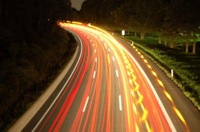 Sometimes I think these blog posts could be marked with a Siskel & Ebert -style ‘thumbs up, thumbs down’ system, where so often I’m merely indicating my approval or disapproval of what some pundit or other is saying in the mainstream press. If we did have that system in place, I’d be marking this post with a huge thumbs up, or a big, green check mark (or ‘tick’, in British English).
Sometimes I think these blog posts could be marked with a Siskel & Ebert -style ‘thumbs up, thumbs down’ system, where so often I’m merely indicating my approval or disapproval of what some pundit or other is saying in the mainstream press. If we did have that system in place, I’d be marking this post with a huge thumbs up, or a big, green check mark (or ‘tick’, in British English).
In an editorial today, the traditionally liberal LA Times delighted me by destroying the proposal that speed limits should be reduced to help conserve gasoline and to help reduce fatalities, both suggestions I’ve reacted against in the past for the same reasons. Here are some of the best bits:
“Excuse us if we chortle at federal legislation that aims to lower highway speed limits.”
“Another decade, another gas crisis — and, of course, another attempt to put the brakes on our driving fun.”
“Speier’s bill would employ 1970s tactics to solve our 21st century problem. We have more effective tools now, such as technology to drastically improve fuel economy and to telecommute for some jobs.”
“It hasn’t been thought through, and it should be stopped in its nascent tracks.”
“Supporters of a lower speed limit say oil prices aren’t the only reason to ease up on the gas pedal, that slower highway traffic would mean fewer and less-serious collisions. But contrary to conventional wisdom, the research on this is mixed, with much of the data indicating that higher speed limits either don’t affect safety in most cases or actually improve it.”
Higher speed, safer driving? That sounds as counterintuitive as John Lott’s ‘More Guns, Less Crime’. Both are arguments I’ve been preaching for years, utilizing data from some of the safest roads in the world: the German autobahn, most miles of which don’t have any speed limits at all.
For the rest of the editorial, click here.

